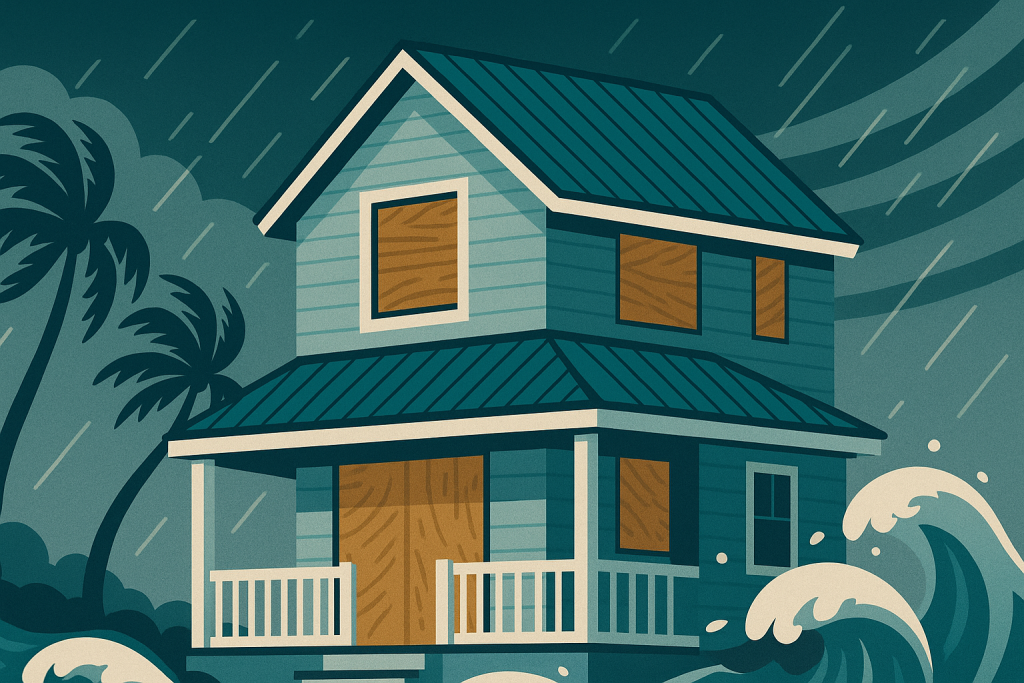Your Florida Dream Home vs. Mother Nature: A Real Talk Guide to Hurricane Preparedness
Picture this: You’re sipping your morning coffee on your beautiful coastal deck, watching dolphins play in the waves, when your phone buzzes with a weather alert. Hurricane season is here again, and suddenly that paradise view comes with a reality check.

If you’re living the Florida coastal dream, you already know the deal. Six months out of every year, we’re all amateur meteorologists, tracking storms and hoping they’ll curve away from our slice of heaven. But hope isn’t a strategy – and after watching neighbors lose everything to storms like Ian and Michael, most of us have learned that the hard way.
Let’s Be Honest About What We’re Up Against
Living on Florida’s coast is like having a front-row seat to nature’s most spectacular – and terrifying – show. While your inland friends worry about strong winds, we’re dealing with a whole different beast. It’s not just the wind that’ll get you (though 150+ mph gusts aren’t exactly gentle). It’s that wall of water that comes with it.
I still remember talking to a friend after Hurricane Ian hit Fort Myers Beach. She’d lived there for 30 years, survived countless storms, and figured her house, which had made it through everything else, would be fine. The storm surge had other plans. Fifteen feet of angry ocean water doesn’t care how long you’ve been paying your mortgage.
That’s the thing about coastal living – we’re not just dealing with a bad thunderstorm. We’re potentially facing what amounts to a temporary ocean relocation project, and our homes are unfortunately in the way.
Getting Your Home Battle-Ready (Without Breaking the Bank)
Okay, let’s talk about turning your house into a fortress without making it look like a prison. Hurricane shutters are your best friend here, but I get it – nobody wants to live behind metal barriers year-round. Impact windows are pricier upfront, but they’re like insurance you can see through. Plus, they cut down on noise from that tourist-filled beach bar down the street.
Here’s something most people don’t think about until it’s too late: that gorgeous patio furniture you splurged on? In 100+ mph winds, your expensive outdoor dining set becomes very expensive projectiles. I learned this lesson when my neighbor’s grill ended up in my pool after Hurricane Irma. Now everything either goes inside or gets tied down like we’re preparing for the apocalypse – because essentially, we are.
And about that roof – if you’re still rocking the original shingles from 1995, it’s time for an upgrade. Metal roofs aren’t just trendy; they’re practical. They’ll outlast you, your mortgage, and probably your great-grandkids.
Stocking Up Like a Survival Show Contestant
Remember when everyone panic-bought toilet paper in 2020? Hurricane prep shopping is like that, but with higher stakes and less availability. The smart money is on buying supplies in March when the stores are fully stocked and nobody’s fighting over the last case of water.
Here’s my rule: if I can’t survive for a week without leaving my house, I’m not ready. That means water (and lots of it – you’ll be surprised how thirsty stress makes you), food that doesn’t need cooking (because your power will probably be out), medications, and enough batteries to power a small electronics store.
Pro tip from someone who’s been through this rodeo a few times: buy a good cooler and learn to love canned food. Your Instagram-worthy kitchen isn’t going to help when there’s no electricity for your fancy espresso machine.
The Great Evacuation Debate: Stay or Go?
This is where it gets real, folks. When the sheriff’s deputy is going door-to-door telling everyone in Zone A to get out, that’s not a suggestion – it’s a “pack your stuff and leave unless you want to explain to Saint Peter why you thought you were tougher than a Category 4 hurricane.”
I know, I know. You’ve got that friend who’s “ridden out every storm since Andrew” and loves to tell war stories about surfing in their living room. Don’t be that person. The ones who stay and regret it don’t usually get to tell their stories.
Plan your escape route like your life depends on it – because it might. Know where you’re going, have multiple ways to get there, and leave early. Trust me, sitting in evacuation traffic for 12 hours beats explaining to your insurance company why you thought you could outsmart a hurricane.
Insurance: The Adult Part Nobody Wants to Talk About
Let’s talk about everyone’s favorite topic: insurance. Your regular homeowner’s policy covers a lot of things, but flood damage isn’t one of them. And guess what causes most of the damage in coastal storms? That’s right – water.
Flood insurance is like a gym membership – you pay for it, hoping you’ll never really need it, but when you do need it, you’re really glad you have it. Just remember, there’s a 30-day waiting period, so don’t wait until there’s a storm in the Gulf to call your agent.
Embracing Our High-Tech Hurricane Era
Gone are the days when we relied solely on Dan Rather standing in the rain to tell us how bad it was getting. Now we’ve got apps that track storms with incredible precision, weather radios that sound like air raid sirens, and enough portable chargers to keep our phones alive longer than the power grid.
Download every weather app you can find, sign up for local emergency alerts, and invest in a weather radio. When the cell towers go down (and they will), that little radio becomes your lifeline to the outside world.
After the Storm: The Real Work Begins
Here’s what nobody tells you about hurricanes – the storm itself is just the opening act. The real show is what comes after: the insurance adjusters, the contractors who suddenly appear like mushrooms after rain (some legitimate, some not so much), and the months of living in a construction zone while your house gets put back together.
Start building relationships with contractors before you need them. Get references, check licenses, and remember that anyone asking for full payment upfront is probably not someone you want rebuilding your roof.
The Bottom Line: This is Our Reality
Look, living on Florida’s coast means accepting that hurricane season comes with the territory. It’s part of the price we pay for year-round sunshine, no state income tax, and the ability to walk to the beach in our pajamas.
But here’s the thing – we can’t control when storms come or how strong they’ll be. What we can control is how ready we are when they show up uninvited. Every hour you spend preparing now is an hour you won’t spend stressed out when the next big one is bearing down on us.
Your coastal paradise is worth protecting. Start now, stay prepared, and remember – we’re all in this together. After all, there’s nothing quite like the community spirit that emerges when we’re all boarding up our windows and arguing about whether this one’s going to hit us this time.
Because let’s be honest – it’s not a matter of if, it’s a matter of when. And when that time comes, you’ll want to be ready.

